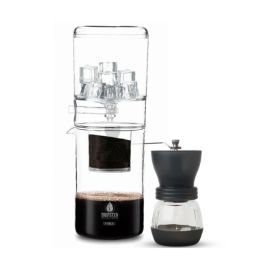
Turkish coffee isn’t just a beverage; it’s a cultural emblem steeped in tradition, bringing people together with its unique preparation and serving style. Renowned for its strong flavor and the ritualistic way it’s brewed and enjoyed, Turkish coffee holds a special place in the hearts of those who savor it.
Beyond its cultural richness, Turkish coffee also offers various health benefits, which have garnered attention in wellness circles. This article delves into the health advantages of this cherished brew, exploring how it can impact our physical and mental well-being when consumed in moderation.
Key Takeaways
- Boosts Performance: Turkish coffee is known for its ability to sharpen your focus and elevate your energy levels. Its caffeine content is a natural stimulant that can help you stay alert and improve your mental clarity.
- Heart and Liver Health: A moderate intake of Turkish coffee might be good for your heart and liver. The antioxidants and compounds in the coffee have been linked to improved cardiovascular health and liver protection.
- Chronic Disease Risk Reduction: Enjoying Turkish coffee could potentially lower your risk of several chronic conditions, such as type 2 diabetes and certain neurological diseases, thanks to its rich antioxidant profile.
- Importance of Moderation: While Turkish coffee has its perks, moderation is key. Its high caffeine content and the presence of certain compounds in unfiltered coffee can pose risks if consumed in excess. Balancing your intake can help you enjoy the benefits while minimizing potential drawbacks.
Cognitive and Mental Health Benefits
Did you know that your morning ritual of enjoying Turkish coffee could be a boon for your brain health? Studies suggest that the compounds in Turkish coffee might offer a shield against neurodegenerative diseases like Alzheimer’s and Parkinson’s. The antioxidants and caffeine present in Turkish coffee are thought to play a significant role in this protective effect.
Imagine starting your day with a beverage that not only wakes you up but also sharpens your focus. Turkish coffee does just that. Its caffeine content acts as a stimulant, enhancing your alertness and concentration. This makes it a perfect companion for those mornings when you need an extra boost to kickstart your day.
Moreover, there’s a silver lining for those who enjoy their daily cup of Turkish coffee: it could be a mood enhancer. Some research indicates that moderate coffee consumption is associated with a lower risk of depression. So, that delightful cup of Turkish coffee isn’t just pleasing to the palate; it might also be contributing to your mental well-being.
Cardiovascular Health
When it comes to heart health, Turkish coffee might just have a few tricks up its sleeve. Consumed in moderation, this potent brew has been linked to various cardiovascular benefits. It’s thought that the antioxidants in Turkish coffee can improve blood flow and reduce inflammation, which in turn may lower the risk of heart disease.
But here’s an interesting twist: while excessive coffee consumption isn’t recommended, a moderate amount could potentially reduce your stroke risk. This is believed to be due to the unique blend of compounds in Turkish coffee that may influence blood pressure and cholesterol levels in a favorable way.
Physical Performance and Endurance
Ever wondered why some athletes swear by Turkish coffee before their workouts? The secret lies in the caffeine content. Caffeine, a well-known stimulant, not only boosts your alertness but can significantly enhance your physical performance. It increases adrenaline levels, preparing your body for intense exertion and potentially improving your endurance. Whether you’re hitting the gym, going for a run, or engaging in any strenuous activity, a cup of Turkish coffee might be the perfect pre-workout drink.
But the benefits don’t stop there. After your workout, Turkish coffee can aid in your recovery. Caffeine helps reduce muscle soreness, allowing you to bounce back quicker from your exercise routine. Just a cup could make a noticeable difference in how you feel post-workout.
Diabetes and Liver Health
Switching gears to internal health, Turkish coffee might have some protective effects against diabetes and liver disease. Research indicates that the compounds found in this robust beverage could influence insulin sensitivity and glucose metabolism, which plays a crucial role in managing and potentially lowering the risk of type 2 diabetes.
And let’s not forget about the liver, an organ crucial for various bodily functions. Moderate consumption of Turkish coffee might be associated with a lower incidence of liver disease. It’s believed that the coffee’s antioxidants contribute to this protective effect, offering another reason to enjoy your daily brew.
Digestive Health and Longevity
Now, how about the benefits of Turkish coffee on your digestive system and overall lifespan? Digestion-wise, Turkish coffee is known to stimulate gastric acid production, which can help break down food more effectively. This can be particularly beneficial after meals, aiding in digestion and contributing to a smoother digestive process.
Nutritional Content
Turkish coffee is more than just a delightful morning ritual; it’s a beverage brimming with nutrients and antioxidants. Each sip offers a dose of essential nutrients like magnesium, potassium, and vitamin E, contributing to your daily nutritional needs. But the real stars are the antioxidants, like chlorogenic acid, which combat free radicals, reducing oxidative stress and inflammation.
Not to forget, these antioxidants can have a positive impact on gut health, aiding digestion and promoting a balanced gut microbiome.
Potential Risks and How to Enjoy Responsibly
While Turkish coffee is a treasure trove of benefits, moderation is key. High caffeine content can lead to restlessness, anxiety, or sleep disturbances in sensitive individuals. And remember, Turkish coffee is often unfiltered, which means it contains compounds that could raise cholesterol if consumed excessively.
To enjoy Turkish coffee responsibly, limit your intake to a couple of cups per day and consider reducing added sugar to keep it healthier.
Brewing Turkish Coffee at Home
Ready to bring the aroma of Turkish coffee into your home? It’s simpler than you think. You’ll need finely ground coffee, water, a cezve (a small Turkish coffee pot), and sugar if you like it sweet. Combine water and coffee in the cezve, add sugar to taste, and stir. Heat slowly over low heat until it begins to froth, but don’t let it boil.
Pour the frothy part into a cup, return the cezve to the heat, and pour the rest once it starts frothing again. There you have it, a cup of rich, aromatic Turkish coffee, steeped in tradition and ready to savor.
FAQs
How much Turkish coffee is optimal daily?
While Turkish coffee can be a delightful part of your day, moderation is key. Aim for no more than 2-3 small cups a day to avoid the pitfalls of excessive caffeine consumption.
Can Turkish coffee aid in weight loss?
Yes, the caffeine in Turkish coffee can boost metabolism and enhance fat burning. However, it’s not a magic solution. Balanced nutrition and regular exercise are crucial for effective weight loss.
Does Turkish coffee affect hair health?
There’s no direct link between Turkish coffee and hair health. However, the antioxidants in the coffee might contribute to overall wellness, which can indirectly benefit hair health.
Final Thoughts
Turkish coffee isn’t just a beverage; it’s a tradition rich in history and flavor. While it comes packed with potential health benefits—from enhancing mental alertness to supporting heart health—it’s essential to enjoy it in moderation. Remember, the key to harnessing the perks of Turkish coffee while minimizing any risks lies in balanced consumption.









